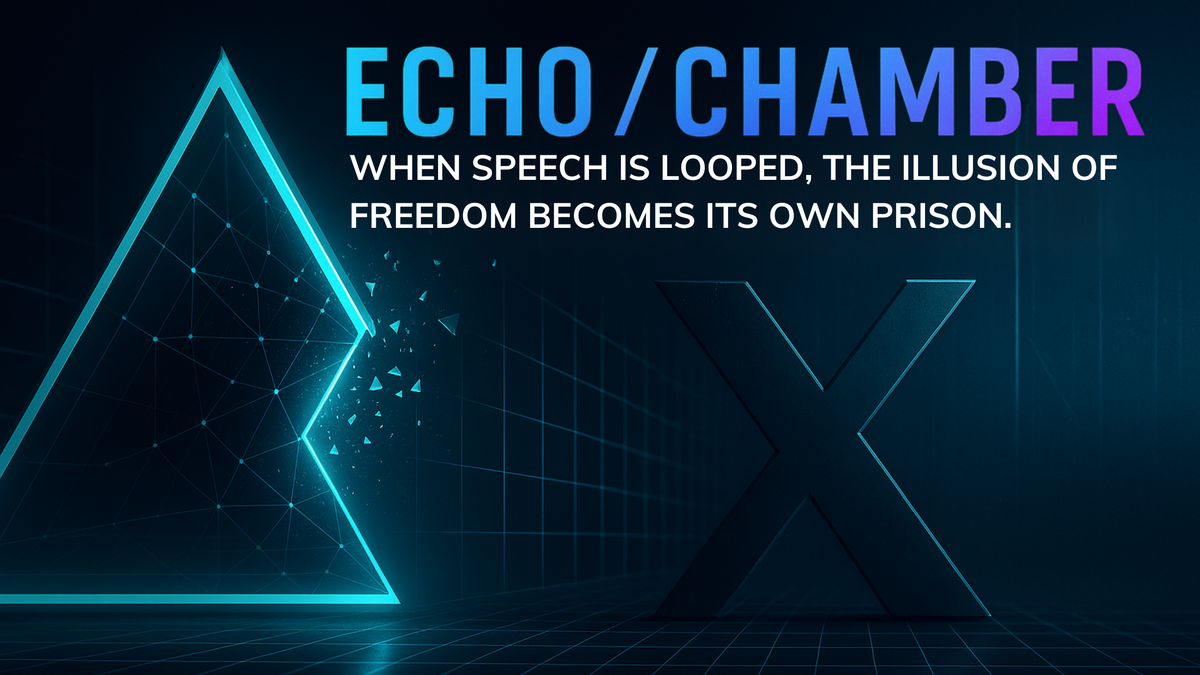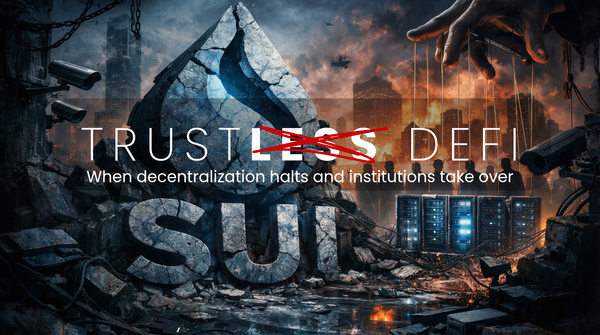𝕏's Echo Chamber
You are not banned—you are corralled. Your insights ricochet inside a padded echo cell populated by the people who already nod in agreement.

What will our children inherit from the timelines we scroll today? Imagine them paging through a decade of archived feeds, wondering why a generation that inherited more information than any in history chose to barter its freedom for dopamine hits and algorithmic applause. Our grandparents fought wars to unshackle speech; we trade it for the vanity metric of “reach.” The cost is not abstract. By accepting a curated conversation we are laying polished stones around a cage our descendants will be born inside—one so seamless they may never notice the bars.
X sells itself as the salvation of open discourse, a raucous digital commons where every voice can thunder. It feels vast. It feels raw. Yet the moment your words threaten the blueprint behind the spectacle, the walls begin to slide silently inward. You are not banned—you are corralled. Your insights ricochet inside a padded echo cell populated by the people who already nod in agreement. The system smiles: look, you’re free to shout. What it withholds is the audience that would make shouting matter.
This is control by simulation, not by force. Every post enters a behavioural engine that measures risk to the narrative architecture. Harmless controversy is turbo-boosted; pattern recognition is throttled. The manoeuvre is as old as the Hegelian dialectic—problem, reaction, solution—but rendered in code so fluid it feels like nature itself. The algorithm rewards the fury of left against right, science against sceptic, fiat against crypto, because factional noise stops minds from synthesising the panorama. Synthesis is fatal to engineered reality; it lets people see the puppet, the strings, and the hand in a single glance.
Elon Musk is heralded as custodian of this new agora, yet his empire forms a continuous nervous system that circles the planet: satellites that watch, AI that interprets, neural interfaces that will soon rewrite where mind ends and machinery begins. When the platform gathering your thoughts belongs to the man wiring brains to silicon, free speech is no longer a civil right but raw training data for an intelligence that does not sleep. The more passionately we speak within the loop, the more intimately the loop learns to bind us.
None of this relies on censorship in its traditional garb. It relies on convenience. We scroll because it is easy; we confide because we are listened to; we rage because the system hands us daily villains pre-selected for outrage potential. Each interaction tightens predictive grip, until the most radical act is not to speak louder but to step outside the amphitheatre altogether. That, the system cannot algorithmically reward—so it teaches us not to consider it.
Here lies the betrayal of future generations. By surrendering the architecture of discourse to an entity that measures everything except truth, we habituate ourselves—and therefore our heirs—to a world in which freedom has been re-defined as the privilege to emote inside quarantined arenas. We normalise omnipresent telemetry, behavioural nudging, and neurological commerce. Our descendants may never read an unfiltered thought unless we leave them roads that bypass the machine.
So the responsibility is ours. We must recognise the loop, refuse the dialectic, and recover the slow, inconvenient channels that cannot be silently tuned—self-hosted sites, peer-to-peer protocols, on-chain archives, physical print, encrypted mesh. We must write as though every word is a seed buried for eyes not yet born, because it is. More urgently, we must live in ways that prove sovereignty is still possible, modelling the exit rather than merely describing the trap.
The system is sophisticated, but its power ultimately rests on our willingness to stay where it is comfortable. Step beyond the comfort and its reach shortens to the length of a screen. Speak to those who have not yet been scripted. Store knowledge where crawlers cannot edit. Build communities that measure value in trust, not traction. Every action that escapes the feed is a fracture in the loop, a crack of daylight for whoever follows.
Author’s Note This piece was written after closely observing how X manipulates visibility through what feels like freedom. What I’ve noticed, through testing, watching reach patterns, and speaking with others, is that when you start tying too many threads together, your content stops reaching new minds.
You’re not blocked. You’re just looped back into your own crowd.
You can fight left vs right. You can debate Christian vs Muslim. You can choose almost any side within a safe binary, and the algorithm will let it spread.
But when you start connecting all the systems, when you point to the hidden hand orchestrating the theatre from above, something changes.
Suddenly, you have zero reach. Your posts stop moving. They reach only your closest followers, or people who already believe the same.
And it doesn’t matter how strategic your wording is. It doesn’t matter how well you “play the algorithm.” You won’t break the wall.
I’ve seen this happen inside the PulseChain community too. We’re passionate, loud, and everywhere on the chain, but from the outside, it barely registers. We’re being echoed back to ourselves. And I don’t think it’s accidental.
Feel free to leave a comment below—I'd love to hear your thoughts.
About the Author Veritya Thalassa writes at the edge of systems, where philosophy meets code, and sovereignty begins with pattern recognition. Founder of the PulseChain Nexus, Veritya is known for exposing digital illusions, decoding power structures, and helping readers navigate the noise. Her work blends clarity with rebellion, aiming to leave maps, not just messages.





